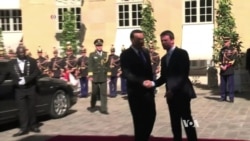For the past week, the red carpet has been rolled out across European cities for Chinese Premier Li Keqiang’s visit. Climate change was high on the agenda – but economics and trade dominated.
Speaking at a summit in Brussels, Li said China and Europe should expand mutual investment and even make joint investments.
China has created a vehicle for joint investment – the Asia Infrastructure Investment Bank or AIIB, with 50 founding members including Britain, France and Germany.
Washington had urged its European allies against signing up.
Europe joined
The bank has an initial capitalization of $100 billion – and Europe was anxious to get on board, said Raffaello Pantucci of the Royal United Services Institute.
“That’s a lot of infrastructure to be developed in Asia in a part of the world that really needs it. So being on board from an early stage to help shape the direction in which it’s going, is I think really key," Pantucci said.
China sees the AIIB as a way of countering what Beijing perceives as a unipolar world dominated by the United States, said Olivia Gippner of the London School of Economics, who spoke with VOA via Skype.
"The United States having a veto in the IMF, having a veto in the World Bank. The IMF reforms which were agreed on in 2010, where actually developing countries were supposed to get high-level voting rights are being blocked by the United States," Gippner said.
US concerns over AIIB
Washington has voiced concern that the AIIB could be used to finance strategic aims rather than economic. The criteria for financing is likely to differ from the World Bank or IMF, Pantucci said.
“In certain countries in parts of central Asia or south Asia which have difficulty in dealing with some of the criteria laid out by the international banks, AIIB may be able to help there instead," he said.
China signed a series of trade deals, including the purchase of 45 Europe-made Airbus planes worth $11 billion and the opening of an Airbus factory in China.
Meanwhile, U.S. President Barack Obama signed into law a bill allowing him to fast-track negotiations over trade deals.
The United States is spearheading the 12-nation Trans-Pacific Partnership, which would encompass 40 percent of global trade. China is not part of the deal.





